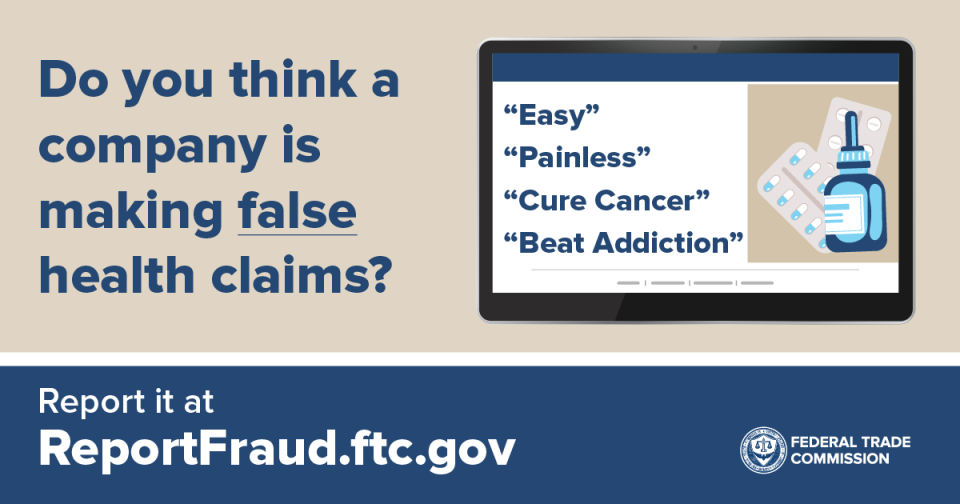If you or someone you love is struggling with addiction or dealing with a serious disease like cancer, Parkinson’s, or Alzheimer’s, you’ve probably looked for the best treatment out there. But how do you know if promises in ads about treatments and recovery are true?
Some health care providers say they’ll cure all kinds of diseases and addictions — without reliable proof that they can. That includes medical clinic AWAREmed and the physician who ran it, Dr. Dalal Akoury, according to the latest complaint and settlement filed by the U.S. Department of Justice on the FTC’s behalf. The FTC says that AWAREmed and Akoury used misleading ads promising a painless 10-day recovery from a variety of addictions — from drugs and alcohol to food and gambling. When it came to cancer treatments, they promised that most patients would get back to work and regular social activities, even becoming cancer-free, after visiting the clinic. But, according to the FTC’s complaint, AWAREmed didn’t have scientific research or testing to back up their claims.
Thanks to a settlement with the FTC, AWAREmed and Akoury have to pay $100,000 and can’t make claims about treatments or cures without actual scientific evidence.
Before you say yes to any kind of specialized medical treatment
- Talk to your doctor or healthcare professional.
- Search for the name of the treatment or product online, plus the words “review,” “complaint,” or “scam.” See what others are saying.
- Know that no government agency approves ads about medical treatments before they go public.
Read more about common health scams. And if you think a company is making false health claims, report it to the FTC at ReportFraud.ftc.gov.


Is $100,000 considered a good outcome? How long did AWAREmed and Akoury run this scam? How much did they take from their patients? Doesn't seem like a satisfactory outcome...
In reply to Is $100,000 considered a… by Mark Harpst
I agree
In reply to I agree by Cherron Roberts
I agree
In reply to Is $100,000 considered a… by Mark Harpst
I agree. $100,000. Is a drop in a bucket considering the amount of money they most likely collected from Insurance Companies Social Security etc. It seems the FTC is another worthless part of government receiving high paying jobs great retirements etc. that allow cheats to exist and no real penalty’s.
Sad.
In reply to I agree. $100,000. Is a drop… by R C Fritz
At least they're trying to do something.
In reply to Is $100,000 considered a… by Mark Harpst
Whom really received the money to pay for this project. If the persons whom went to treatment for this and they were “cured” then the money they received may have been used to help them recover from their illnesses or help them with living expenses or medical expenses. That’s one thing but if they were or are still suffering from this illness and they received compensation from the government for the damages caused by the treatment that they received.
How do persons know how to get the compensation. What about the insurance companies whom paid the claims who’s paying them. How do people know how to differentiate if something’s a scam or not.
There’s so many factors involved in this problem and how do normal people handle this problem and or know if it’s a scam or not . How do people deal with filing claims and get compensation. How do they know to file the claims.
In reply to Is $100,000 considered a… by Mark Harpst
So the dr is supposed to pay 100000 dollars in court and still continues to practice or provide services If the persons whom went to treatment for this and they were “cured” then the money they may or may not receive may have been used to help them recover from their illnesses or help them with living expenses or medical expenses.
That’s one thing but if people whom went and paid for treatment and received treatment and are still sick and how is 100000 dollars going to help multiple people who are still suffering. There seems to be more to this problem and how normal people are unable to differentiate between a scam and real health clinics. If people used insurance to cover their costs who’s going to pay the insurance companies back.
In reply to Is $100,000 considered a… by Mark Harpst
I was thinking the same thing. $100k doesn't equate to the nature of the crime.
In reply to Is $100,000 considered a… by Mark Harpst
That’s what I was thinking too
In reply to Is $100,000 considered a… by Mark Harpst
I have agree but we dont know all the facts so I wont say there should have been more punishment to it. But, good thing they got him now if they catch him no excuse.
In reply to Is $100,000 considered a… by Mark Harpst
I couldn't agree more. 100K as a fine by this company is just a Big J-O-K-E compared to the epic amout of momey they made all through Pure LIES!
Thank you for making me aware of medical scams ,
I Appreciate your alerts,
And how to check out medical claims for health benefits
How prevalent a scam is this?
In reply to How prevalent a scam is this? by Jeremy V.
It's extremely prevalent.
We (me & husband) keep receiving text, emails, calls about us having cancer, involved in car wreck, morphine addition, having needed caregiver due to injury, and none are true, why?
I cannot believe people would actually do this to someone not caring how it,s going to effect that person's life family and friend's
.